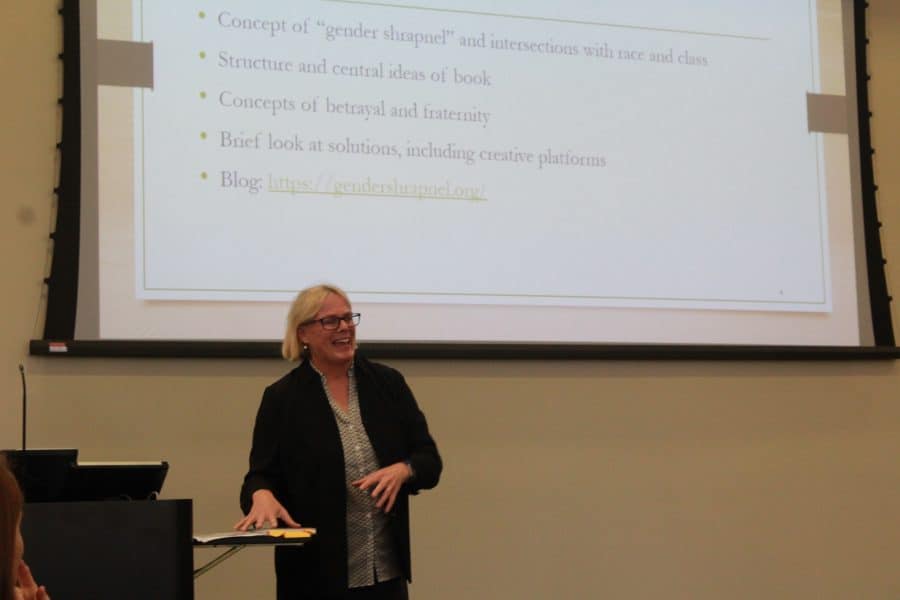Students, many members of the faculty and others from various social organizations gathered in Gorgas 205 on Thursday. They came to hear Ellen Mayock talk about gender equality and sexual harassment in workplaces and on college campuses.
Mayock, Ernest Williams II Professor of Spanish at Washington and Lee University, is the author of the novel Gender Shrapnel in the Academic Workplace, which her lecture is named after.
Before the lecture, Mayock asked the audience to interact with someone they have not spoken to. The exercise involved telling someone about an uncomfortable or out of the ordinary interaction that happened in an academic or work setting. Mayock argued that these interactions might seem awkward or pointless to some. However, she said when people interact, it is important to listen to the details of what they are saying so that connections can be made on a deeper level.
The activity gave way to Maycock explaining her book. She said that in sections of her book are a series of stories that give a contextualized narrative of how gender problems can unfold in an institution. The book goes on to look at problems and later offers solutions.
Among the problems that Mayock noticed while writing the book, were micro-aggressions. Micro-aggressions, if experienced little by little, accumulated and will make someone feel marginalized.
“If you don’t address them, then you’re frustrated”, Mayock said.
Sexual harassment is not a topic that is frequently talked about vocally. Maycock said sexual harassment, discrimination and retaliation are oftentimes looked at as little things.
“Even though we are in the FOX news, Bill Cosby, Weinstein explosion of cases… we tend to make these events smaller than they actually are, especially when colleges and universities need to get to the question of sexual assault and sexual violence,” Maycock said. “If we’re not dealing well with the problems of harassment and retaliation, then there’s no way we’re gonna handle problems like sexual assault and sexual violence,.”
Alexandra Perkins, an instructor of Spanish, attended Maycock’s lecture and said it is not often that people speak openly about problems of sexual harassment and sexual assault. Perkins said that these are problems that everyone should be willing to talk about on a regular basis.
“It was a very timely lecture on a subject that is very important today, generally but also for university culture and making the changes that we need to make in workplaces,” Perkins.
Maycock said it is also important to have good messaging from the top down.
“The president of the university or the CEO of the organization has to care,” Maycock said. “They have to demonstrate that she or he cares every single minute of every single day by modeling equitable behavior and by incorporating fair language in policy statements… and by hiring across the board.”
There are solutions that workplaces and colleges or universities can take to further educate people on the topics of sexual discrimination and assault. Instead of having online programs that are completed once a day, Mayock insists that universities and workplaces should implement real and regular programs to refresh and educate the memories of people. She said that such programs should be required for staff, faculty, and students alike.
“A lot of places, especially places as big as the University of Alabama, have so many employees so that what they’re instituting is something like an online sexual harassment avoidance training program,” Maycock said. “This really demonstrates that it really isn’t a priority. People are just clicking boxes, alone in their offices, thinking that they understand the problem.”
Overall, Mayock is mostly optimistic about the direction of gender equality, but said there is more to be done.
“As a whole, we have the tools to work to make things better,” Maycock said. “We just have to be ready to implement those strategies and open up dialogue in order to create a better situation for everyone on campus and in the workplace. Gender equality is an issue that affects everyone. Not just women but men as well… it’s an everybody issue.”









